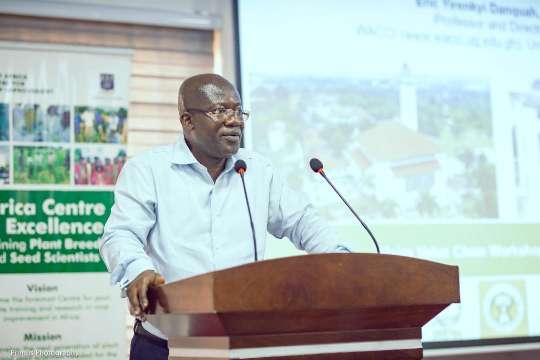Accra, Mar. 22, GNA – The West Africa Centre for Crop Improvement (WACCI) of the University of Ghana, will collaborate with all actors in the maize value chain to stop maize imports into Ghana. Professor Eric Danquah, WACCI’s Founding Director said as part of efforts to ensure food security in the country, the African Union Commission and the European Union were funding the Centre’s proposal on four commodity crops including maize with an amount of one million dollars.

Prof. Eric Danquah
Prof Danquah speaking at the opening of a two-day Maize Value Chain Workshop at the University of Ghana in Accra, said there was the need for Ghana to employ modern technology in agriculture to improve on farming. The two-day workshop dubbed: “Private-Public Partnership for the Sustainable Intensification of Maize Production for the Crop’s Value Chain”, is being attended by more than 70 participants. The participants at the workshop included academics, researchers, governmental and non-governmental organisations, farmers, farmer groups, market women as well as manufacturers of agricultural products and equipment. Key issues to be discussed include maize production, processing, transportation, storage and marketing. The workshop is aimed at impacting the Maize Value Chain for the economic prosperity of Ghana, in the quest to meet the Sustainable Development Goal Two: “End hunger, achieve food security and improved nutrition and promote sustainable agriculture”. “While modern technologies are not the silver bullet for the woes afflicting agriculture, they are becoming an important component of the breeder’s toolkit.”
“Africa cannot be left behind in the use of science and big data to revolutionize its agriculture and how we capture, prepare and store data needed for agricultural development should be revolutionized,” Prof Danquah noted. He said the need for efficiency and effectiveness in the development of resilient, high yielding and nutritious crops calls for the use of modern science in plant breeding for “we could not hedge out bets by depending on unknowns.” He said the population of Ghana was growing at least two times higher than agricultural growth; stating that, “Common sense suggests that life may be more challenging if we do business as usual”. “Ghana’s population may hit about 38 million by 2030 when we are expected to meet the SDG2: Zero hunger and we are wondering if we would be able to meet the dietary preferences of the urbanized Ghana. This is why we urgently need the political will to transform the institutions for food and nutrition security,” he added.
Source: GNA
